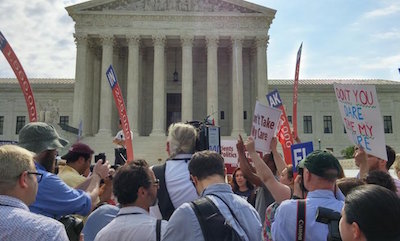‘The Politics of Repeal Are Rooted at the State Level’.

The past months have been marked by a series of close calls for the Affordable Care Act (ACA), or Obamacare. Scores of supporters have mobilized again and again to call their members of Congress; a handful of Republican lawmakers have made dramatic, last-minute defections on repeal; and there has been no end of frustration voiced by President Donald Trump.
These were only the most recent existential threats to the ACA, says David K. Jones, assistant professor of health law, policy & management. He recalls the first: a 2012 Supreme Court case about the constitutionality of the individual mandate and Medicaid expansion. “The fate of my project hung in the balance,” he says, “not to mention insurance for millions of people.”
Jones had chosen to write his doctoral dissertation at the University of Michigan on states’ resistance to the ACA in 2012—before it was challenged twice in the Supreme Court, before the election of Donald Trump, and before 2017’s series of “repeal and replace” attempts.
That project is now a book, Exchange Politics: Opposing Obamacare in Battleground States, forthcoming in December from Oxford University Press. Jones will read from and discuss the book at an event on November 13.
Ahead of the event, Jones sat down to talk about the lessons he learned about state politics, the Republican Party’s recent evolution, and the grassroots strategies liberals will need to borrow to resist the Trump administration’s policies.

What led you to take on this project?
I interned in the Idaho Legislature before graduate school and fell in love with state politics. The people making decisions are relatively accessible but have the opportunity to improve the lives of hundreds of thousands of people. As a native of New York City, I came away from my stint in Boise feeling there’s a lot about rural red states that liberals in the Northeast don’t understand. I’ve remained interested in helping bridge that divide.
Choosing to write about the exchanges was an easy decision because I knew I wanted to study federalism and the ACA. The law was 2 years old as I was beginning my dissertation, and states were deep in the throes of deciding what path to take on an exchange. The expectation up to that point was that virtually every state would make the choice to run their own exchange, because the ACA was written in such a way that any state refusing to build an exchange would cede control to the federal government, and states could also receive a virtually unlimited amount of federal money to build an exchange. Republicans around the country said they liked the idea of an exchange, particularly run at the state level—so it was a big surprise when 34 states rejected control.
I saw some early work by academics trying to use quantitative methods to understand state decision-making. Their findings were interesting, but regression tables fail to capture the passion and personalities of politics. I felt that the only way to truly understand these decisions would be to do thick description case studies. There is a lot of political science theory underneath the narrative that you don’t have to understand to follow what is happening, but many aspects of this story build on and challenge this body of theory.
What did you find was the reason for so much state-level resistance?
The most common explanation for why states rejected an exchange is that they are led by Republicans who didn’t want to give President Obama and the Democrats a victory. That’s definitely an important part of the story, but it obscures the intense amount of work a lot of red states did to consider an exchange and how the conservative position on exchanges evolved over time.
The primary partisan division was often within the Republican Party, not between Republicans and Democrats. In many states there are really three parties: conservative Republicans, moderate Republicans, and Democrats. What policies get developed in these states depends on which wing of the Republican Party is able to gain control of the legislature. My book charts the growth of the Tea Party and provides an in-the-trenches view of how Tea Party activists believed they could undo an entire national law by blocking an exchange in their state. They were amazingly successful, in some cases defeating the most powerful interest groups in the state, including hospitals, insurers, doctors, and consumer advocates.
As I’ve written about on Public Health Post, Tea Party opposition to the exchanges serves as a good model for how liberals could respond to the policies they don’t like from the Trump administration, and more locally. Large rallies like the Women’s March are important symbolically, but arguably a more effective way to influence policy is to directly engage with each step of the policy process. A handful of people speaking up at obscure hearings in Jackson, Mississippi, had a more dramatic effect than rallies attended by a few hundred people on the Capitol steps.
What was your experience becoming an expert on the ACA while its fate was and continues to be up in the air?
When the Supreme Court decided to consider King v. Burwell, which was explicitly about the exchanges, in 2014, the book wasn’t out yet, but I had just completed my dissertation and had followed the state politics of exchanges across the country as closely as anyone. I knew I had to step up and contribute to the debate.
It was a great opportunity for someone in their first year out of grad school. I was one of a few dozen health policy scholars to sign an amicus brief given to the court. I didn’t write the brief, but I was excited that a paper I had written as a doctoral student was cited. I also co-authored a perspective article in the New England Journal of Medicine that had something like half a million views, which is a lot even for NEJM. The coolest moment for me was probably co-authoring an op-ed in the Washington Post with a former Supreme Court clerk.
I was outside the Supreme Court the morning the ruling was released in June 2015. It probably would have been better for my career if the government lost the case, because all the knowledge I had about each state’s exchange would have been in very high demand, but I felt unqualified relief when the decision came out that the government won the case and millions of people could continue receiving help to buy insurance. It was extremely gratifying to have played a small part in that process. I went back the next day to soak in the atmosphere after the court had legalized gay marriage. It was an incredible couple of days.
I came home with one of the signs the activists held up: “The ACA Is Here to Stay!” I used that as the basis of a couple of articles, writing that the ACA had finally survived its last existential threat. I turned out to be pretty wrong about that.
Even so, the lessons from my book are important regardless of what Congress and President Trump do to the ACA. The politics of repeal are rooted at the state level, as are the implications of whatever reform comes next. The decisions made by the Trump administration mean very different things for coverage and premiums depending on decisions states have made to this point.
Was the process of writing this book, and then watching to see what happened before publication, difficult or frustrating?
The first sentence of the book is the opening of the preface, in which I say, “This was a fun book to write.” It really was. I hope it’s a fun book to read.
David K. Jones will discuss Exchange Politics: Opposing Obamacare in Battleground States at a Dean’s Seminar on November 13.